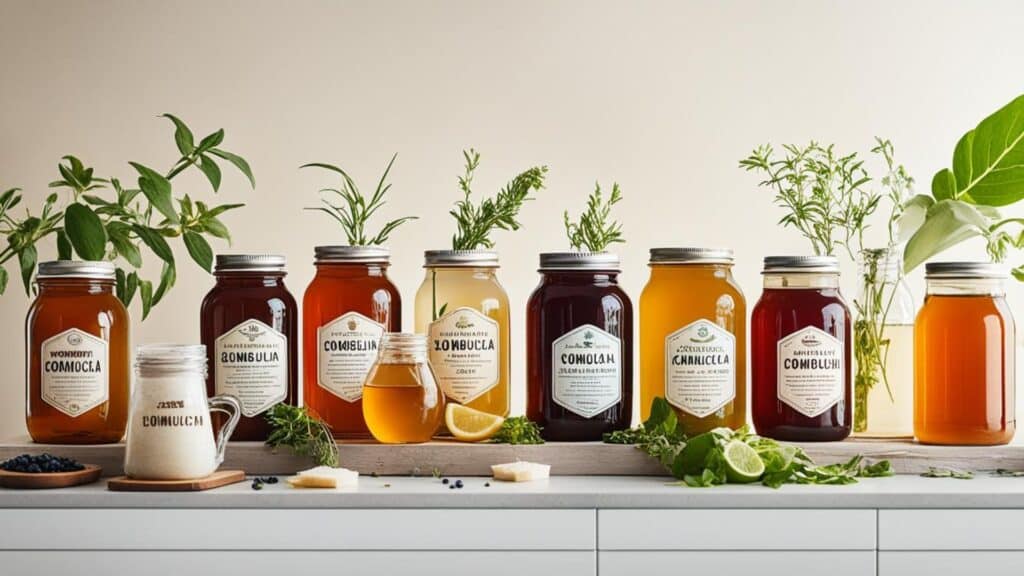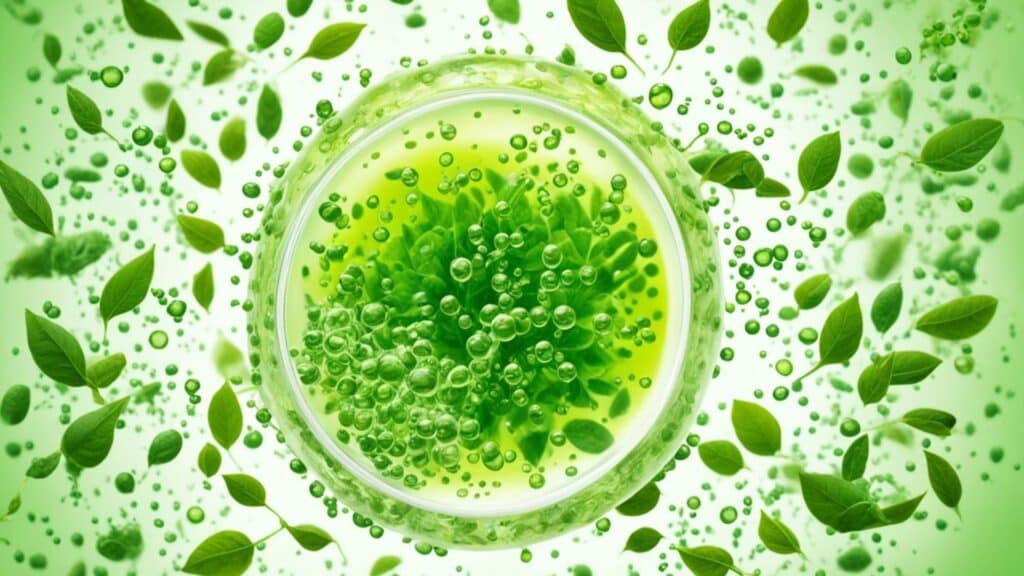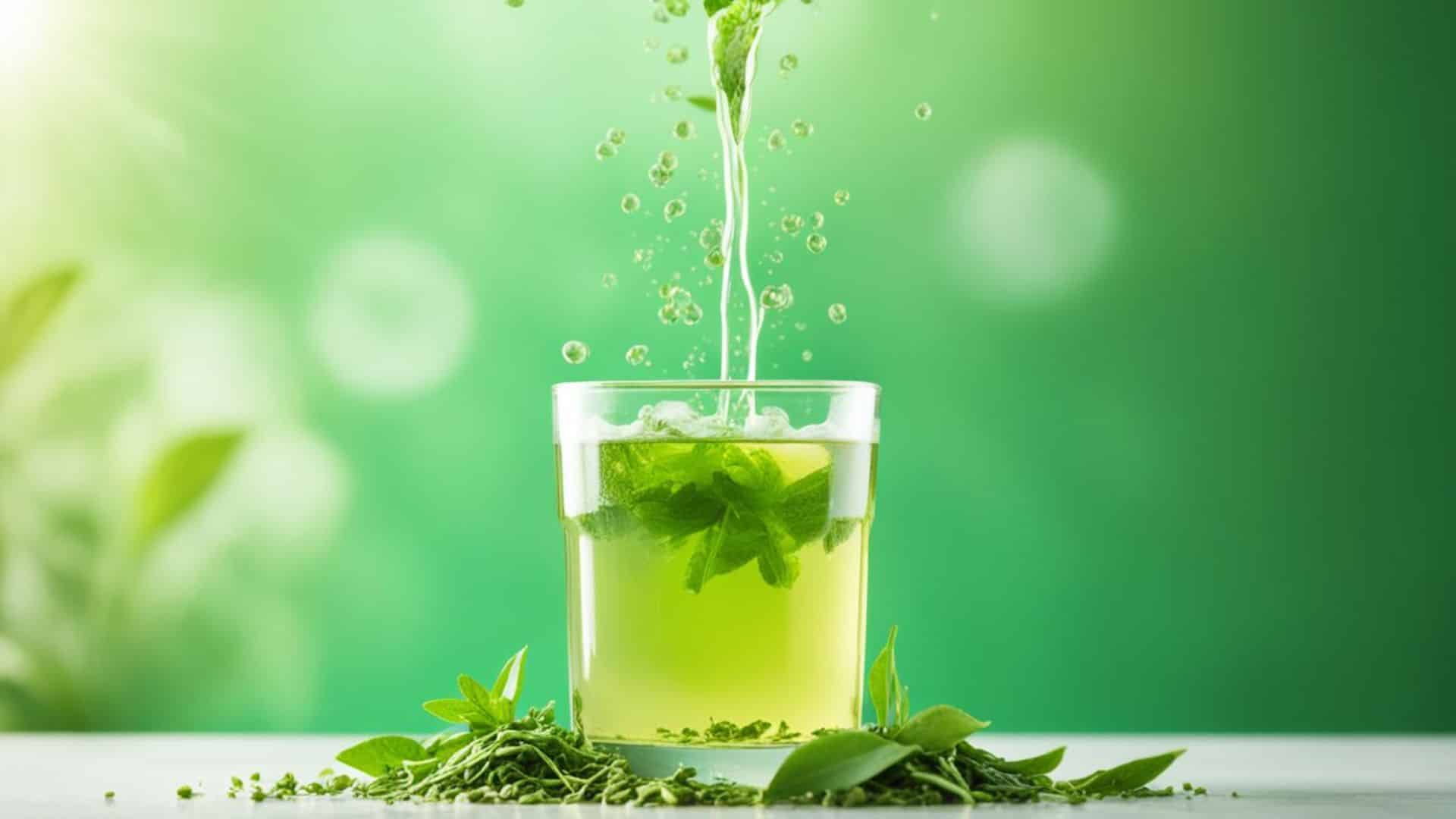Did you know kombucha green tea has more nutrients than regular tea? It’s a great choice for boosting your energy. This drink comes from Asia, Africa, and South America. It’s not just a trend; it’s full of benefits.
It has a creamy color and tastes a bit sweet. Drinking it every day can make your routine more exciting.
Green tea leaves are fermented to make this drink. It’s full of antioxidants and probiotics. These help protect your cells and keep your gut healthy. Drinking it can help you stay healthy and cut down on sugar.
Wonder Drink Kombucha is a great choice. It’s non-alcoholic, organic, vegan, and free from harmful chemicals. They offer a 5% discount on subscriptions. Their Green Tea & Lemon flavor has only 8 grams of sugar per can. It’s a better choice than sugary drinks.
Key Takeaways
- The fanning blends in kombucha green tea offer more nutrient extraction compared to whole leaf teas.
- Kombucha green tea is sourced from Asia, Africa, and South America, ensuring a premium quality.
- This energizing drink is rich in antioxidants and probiotics, making it beneficial for gut health and cellular protection.
- Wonder Drink Kombucha provides a low-sugar, non-alcoholic, and organic option for health-conscious consumers.
- Subscription programs from brands like Wonder Drink offer additional savings and convenience.
What is Kombucha Green Tea?
Kombucha green tea is a bubbly drink that’s a bit sweet. It’s a fermented tea made with sweetened green tea and a SCOBY. This SCOBY starts the fermentation process. The drink is full of vitamins, antioxidants, and probiotics, making it great for your gut.
This tea is made from green tea leaves that are not processed much. It’s lighter in color and taste than black tea. It also has less caffeine, about 25mg per cup, which is good for those who don’t like a lot of caffeine.
Green tea kombucha is fizzy and tastes refreshing. It’s good to switch between green and black tea kombucha to keep the SCOBY healthy. This way, the fermentation stays strong over many batches.
Studies show that green tea kombucha is full of antioxidants. These can help fight inflammation and improve health. You can make it at home with kits from small businesses like Kombucha Kamp. They have great reviews for brewing your own gut-friendly drink.
Green tea kombucha is a tasty and healthy drink. It’s perfect for those looking for a probiotic beverage that helps with digestion. You can enjoy it plain or with flavors, making it a great addition to your daily routine.
Health Benefits of Kombucha
Kombucha green tea is a great health tonic. It’s known for many health benefits. This drink combines kombucha and green tea. It makes a strong antioxidant drink that helps with health and wellness.
Probiotics for Gut Health
Kombucha is full of probiotics. These good bacteria help your gut. They make digestion better, reduce inflammation, and can help with weight loss.
They are good for digestion problems like constipation, diarrhea, and IBS. Studies show kombucha can increase Lactobacillus in the gut. This shows its probiotic and anti-inflammatory effects.
Rich in Antioxidants
Kombucha, made from green tea, is full of antioxidants. Drinking green tea can lower the risk of cancer. Kombucha protects cells and boosts the immune system.
The fermentation process makes these antioxidants even stronger. More studies are needed to prove this. But, rat studies show kombucha can protect the liver from toxins.
Detoxifies the Liver
Kombucha also helps detox the liver. It cleanses the liver with gluconic acid, a byproduct of fermentation. Studies show kombucha can lower liver toxicity from chemicals.
This makes kombucha a great detox drink. Drinking it often can also lower heart disease risk by improving cholesterol levels in just 30 days.
| Health Aspect | Benefit |
|---|---|
| Probiotics | Improves digestion, reduces inflammation, aids in weight loss |
| Antioxidants | Protects cells, supports immune system, may reduce cancer risk |
| Liver Detoxification | Reduces liver toxicity, supports natural detox processes |
| Heart Health | Improves cholesterol levels, reduces heart disease risk |
How to Brew Kombucha Green Tea at Home
Making your own kombucha green tea at home is fun and rewarding. This guide will show you what you need and how to make it. You’ll learn to make tasty, fermented tea in your kitchen.
Ingredients Needed
- 4 green tea bags or 16 grams of organic tea
- 12 cups of water
- 1/2 cup of sugar
- 1/2 cup of kombucha starter liquid
- 1 SCOBY
Step-by-Step Brewing Process
- Boil the water: Start by boiling 12 cups of water.
- Steep the tea: Once the water has boiled, remove it from heat and add the green tea bags or loose organic tea. Let it steep for about 10 minutes before removing the tea.
- Dissolve the sugar: Add 1/2 cup of sugar to the hot tea, stirring until it completely dissolves.
- Cool the mixture: Allow the sweetened tea to cool to room temperature.
- Add the SCOBY and starter liquid: Once the tea has cooled, pour it into a clean, sterilized jar. Add 1/2 cup of kombucha starter liquid and gently place the SCOBY on top.
- Ferment the tea: Cover the jar with a cloth secured with a rubber band and let it sit undisturbed at room temperature for 7-10 days. Opt for closer to 10 days if you are using a new SCOBY.
- Transfer the liquid: Once fermentation is complete, transfer the kombucha to clean bottles, reserving 1/2 cup of the kombucha and the SCOBY for the next batch.
- Carbonate the kombucha: To add fizz, let the bottled kombucha sit at room temperature for an additional 1-2 days before refrigerating.
With this DIY kombucha guide, you can make your own fermented tea at home. It’s cheaper than buying it. You can use organic tea and natural ingredients. This makes a healthier drink for you.
Different Ways to Flavor Your Kombucha
Exploring the flavors of your kombucha is fun and exciting. You can use fruits, herbs, and spices to make it taste great. There are many ways to flavor your kombucha, from sweet fruits to complex herbs.
Fruit Flavors
Adding fresh fruits is a great way to make your kombucha tasty. The author likes to mix passionfruit, raspberry, pineapple, and ginger. Here are some tasty pairings you might like:
- Passionfruit-Pomegranate
- Blackberry-Mint
- Blood Orange-Blackberry
- Tangerine-Rosemary
- Mango-Pineapple
- Plum-Thyme
- Cherry-Ginger
- Strawberry-Lemon
These mix-ins give your kombucha a wide range of flavors. It’s best to use homemade fruit purees or juices for a fresh taste. Add about 1/4 to 1/3 cup of puree or juice to each 16 oz. bottle.
| Flavor Combination | Ingredient Notes | Measurement |
|---|---|---|
| Passionfruit-Pomegranate | Passionfruit pulp, pomegranate juice | 1/4 – 1/3 cup |
| Cherry-Ginger | Fresh cherries, grated ginger | 1/4 cup cherries + 1 tsp. ginger |
| Strawberry-Lemon | Strawberry puree, lemon juice | 1/3 cup |
Herb and Spice Infusions
Herbs and spices can add a new level of taste to your kombucha. Herb and spice kombucha are great for those who like something different. Here are some popular infusions:
- Citrus Mint (blend of orange and mint)
- Apple-Raspberry (cinnamon stick optional)
- Apricot-Hibiscus (using dried hibiscus flowers)
- Peach-Orange Blossom (with a hint of rosewater)
When making herb kombucha, it’s important to get the flavors right. Add about a teaspoon of sugar per bottle for better carbonation. Using fresh fruit purees also helps with consistent carbonation.
Try different fruits, herbs, and spices to make your own kombucha recipes. Be creative and enjoy the many flavors kombucha offers!
Why Opt for Kombucha Over Other Drinks?
Choosing a drink that refreshes and boosts health, kombucha is a top pick. This organic tea has many benefits over regular drinks. It’s a great health tonic for those looking for a nutritious choice.
Low Sugar Content
Kombucha is known for its low sugar content. The fermentation process eats most of the sugar, leaving less in the drink. This makes it a better choice for people with diabetes. A review by WebMD says green tea kombucha can help control or prevent type 2 diabetes by lowering blood sugar.
Nutritional Value
Kombucha is not just low in sugar, it’s full of nutrients. It has vitamins like Thiamine, Riboflavin, B12, and C, and lots of antioxidants. Each 8-ounce serving has 30 calories and 4 grams of sugar, but no fat or protein. It’s a great choice for digestive health, liver detox, and even cancer prevention.
Kombucha with green tea can also help with weight loss by boosting metabolism and burning calories. This makes it a great addition to your diet. Its benefits as a nutritional drink and health tonic make it stand out.
| Drink Type | Sugar Content (per cup) | Calories (per cup) | Key Nutrients |
|---|---|---|---|
| Commercial Soda | 39 grams | 150 | None |
| Fruit Juice | 21 grams | 120 | Vitamin C |
| Kombucha | 4 grams | 30 | Vitamins B, C, Antioxidants |
Kombucha’s benefits can vary, depending on the tea type and fermentation time. But, it’s seen as a health tonic by many. Always drink it in moderation and talk to a doctor if you have health concerns or are pregnant.
The History of Kombucha
Kombucha has a long and interesting history, dating back over 2,000 years. It started in Northeast China around 220 B.C. People there saw it as a drink that could make you feel better and clean your body.

Origin in China
In China, kombucha was called “Hongcha Jun” or “red tea fungus.” It was famous for its health perks. People thought it was like an “Elixir of Life” in traditional Chinese medicine.
It became a key part of Chinese health routines. The fermented tea was known for its healing powers.
Spread to Japan and Russia
Kombucha moved to Japan and Russia from China. In Japan, it was first known as a seaweed tea. But soon, the fermented tea drink became popular.
In Russia, it was called “чайный гриб” (tea mushroom). People loved it for its health benefits, like being a probiotic source.
In the modern era, kombucha became popular again during wartime for its food and health value. By the late 1980s and early ’90s, it was back in the spotlight for its health perks during the HIV/AIDS epidemic.
In the U.S., GT’s Kombucha started in 1995 and led the market. But, a rule change in 2010 made it hard to make kombucha. This led to new ways of brewing it.
Now, kombucha is loved all over the world. It combines its old roots with a new, trendy appeal.
| Year | Event |
|---|---|
| 220 B.C. | Originated in Northeast China |
| 1990s | Resurgence in domestic market |
| 1995 | GT’s Kombucha founded |
| 2010 | Regulation crisis led to stricter brewing guidelines |
Understanding SCOBY: The Heart of Kombucha
The SCOBY is key to making kombucha. It stands for Symbiotic Culture of Bacteria and Yeast. This special mix turns sweet tea into a fizzy drink full of probiotics. People have loved kombucha for over 2,000 years, thanks to the SCOBY.
SCOBY Explained
A SCOBY has lactic acid bacteria, acetic acid bacteria, and yeast. These work together to ferment the tea. This mix makes kombucha brewing special and complex.
The bacteria and yeast eat the sugar in the tea. They make alcohol, carbon dioxide, and acids. These give kombucha its tangy taste and health benefits like better gut health and antioxidants. For more info on SCOBY, see this guide.
How to Care for Your SCOBY
Looking after your SCOBY is key to good home brewing. Here are some tips to keep your SCOBY and tea healthy:
- Sterilize your equipment: Clean all your tools before use to stop bad bacteria.
- Store properly: Put your SCOBY in a clean bag in a quiet, dark spot at room temperature.
- Feed regularly: Give your SCOBY sweet tea to eat and keep it healthy.
| Task | Description |
|---|---|
| Sterilize Equipment | Make sure all your tools are clean to avoid bad bacteria. |
| Proper Storage | Keep it in a dark, cool spot when not brewing. |
| Feeding | Feed your SCOBY sweet tea often to help it grow. |
Looking after your SCOBY well means you’ll always have great kombucha. Whether you’re new or experienced, knowing how to care for your SCOBY leads to tasty and healthy tea for a long time.
The Science Behind Fermentation
Fermentation science makes us appreciate kombucha more. It’s a popular drink full of probiotics. At its heart, the SCOBY (Symbiotic Culture of Bacteria and Yeast) changes sugars into healthy acids and vitamins.

The Role of Bacteria and Yeast
Kombucha’s making is a complex process. Bacteria and yeast in the SCOBY turn sugars into acids, vitamins, and enzymes. This makes the drink taste tangy and helps our bodies use nutrients better.
Healthful Byproducts
Bacteria and yeast in fermentation make many good things. Acetic acid stops bad bacteria, and enzymes help with digestion. B-vitamins and probiotics boost gut health and metabolism.
Kombucha is great for our health thanks to its fermentation and balanced microorganisms. It’s good for detox and can help lower blood sugar. It’s a natural way to stay healthy.
| Type of Tea | Flavor Profile | Benefits |
|---|---|---|
| Black Tea | Strong, full-bodied, astringent | High caffeine content; robust flavor |
| Green Tea | Lighter, refreshing, vegetal notes | Lower caffeine levels; promotes relaxation |
| White Tea | Mild, floral undertones | Minimal processing; delicate flavors |
| Blended Teas | Complex, well-balanced | Enhanced flavors; improved overall experience |
Kombucha Green Tea in Traditional Medicine
Kombucha green tea has a long history in traditional herbal medicine, especially in Traditional Chinese Medicine (TCM). It’s seen as an ancient remedy that helps people live longer and stay healthy. It’s known for boosting the immune system and improving digestion.
Kombucha green tea is linked to TCM for its role in detoxifying the body. It’s widely accepted in traditional herbal medicine for its health benefits. It’s seen as a way to support overall health and a long life.
Studies show kombucha’s strong effects. For instance, a 2012 study in Lebensm Wiss Technol found it has antimicrobial properties. A 2017 study in JAFAG looked at kombucha made with different teas. It showed its health benefits.
A 2018 study in Food Sci Nutr looked at how different plants affect kombucha. It found kombucha is good for many health areas. This study proved kombucha is a key part of ancient medicine for better health.
Kombucha has been a part of daily life for a long time. It’s still popular today for its health benefits. It connects the old ways of healing with today’s health trends.
| Publication | Study Focus | Year |
|---|---|---|
| Lebensm Wiss Technol | Antimicrobial effects of kombucha analogues | 2012 |
| JAFAG | Kombucha fermentation with various teas | 2017 |
| Food Sci Nutr | Impact of medicinal plants on kombucha | 2018 |
Research keeps showing the benefits of kombucha green tea. Its history and health benefits keep it popular in wellness circles. As we learn more, the line between old remedies and new science gets blurry. This leads to a better way of looking at health and wellness.
Conclusion
Kombucha green tea is a great daily booster. It combines the old tradition of tea with new knowledge on probiotics and gut health. As a probiotic beverage, it has many health benefits. These benefits can make you feel better overall.
It helps with energy by making digestion and metabolism better. It also keeps your gut flora healthy, which is key for a healthy life.
Kombucha green tea is full of antioxidants like polyphenols and catechins. These fight inflammation and oxidative stress. It also has vitamins B2, B6, C, and E, and minerals like potassium.
This makes it a top choice for boosting energy and improving mental focus without too much caffeine.
Adding kombucha green tea to your daily routine is more than just drinking a tasty drink. It’s about taking a full approach to health. You can try different flavors to make it fun. With its many benefits, kombucha green tea is a key part of a healthy and fun lifestyle.


